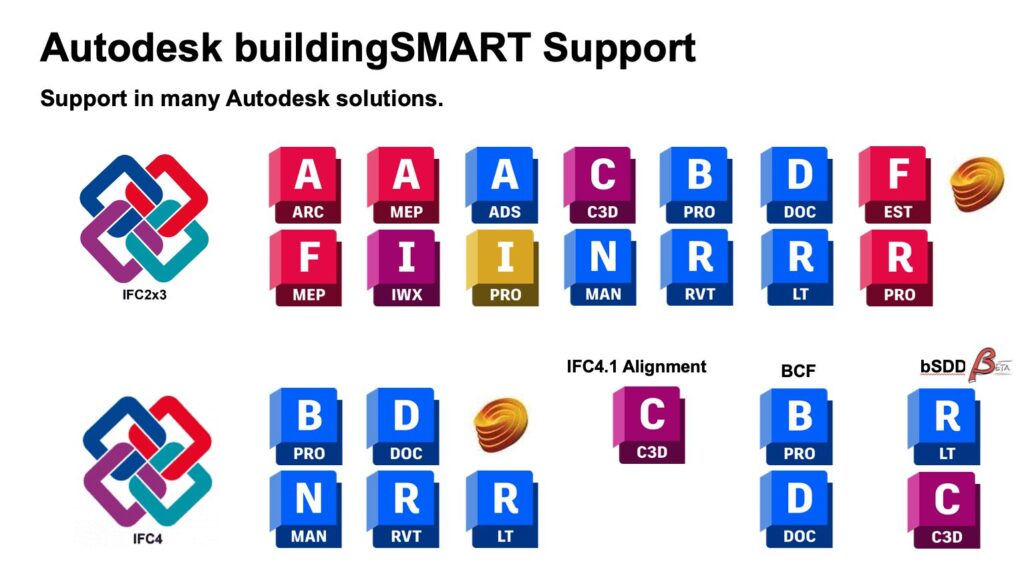
A drive for better interoperability and collaboration is shaping the future of Revit.
What’s new: Revit 2024.1 significantly improved the geometric fidelity of the elements created in newly linked IFC files by using the same technology that enables Inventor’s AnyCAD.
Enhanced Link IFC Fidelity.
When it comes to interoperability, data integrity is critical. With Revit 2024.1, we have taken a significant step forward in our strategy to enhance interoperability between various file formats and open standards. The inclusion of this platform framework greatly enhances the fidelity of geometry when linking IFC files into Revit. This technology enables Revit to greatly improve the stability and fidelity of data through interoperability and ensures it is data you can trust.
Accurate Geometric Representations.
The integration of the new geometric framework enhances the fidelity of geometry and ensures accurate representations. This enables precise representations for complex Boolean operations, such as correctly cutting the extents of geometry with Roofs. It also improves surface fidelity for large models away from the origin, which were previously unstable. Furthermore, the modernization of tolerances and acceptance of geometric data resolves previous instances where geometry may have been missing from the file.
Autodesk Platform Framework.
Revit has integrated the technology behind Inventor’s AnyCAD, which enables other products within Autodesk to leverage the same technology for consistent results across products. Regardless of the Autodesk application using IFC data, the integration of this technology ensures consistent and accurate data. Additionally, Revit can now deliver additional enhancements to data fidelity and improved performance more effectively and frequently.

What We’re Aware of: With the significant advancement of geometric fidelity and stability, at this time, Link IFC may be less performant than the legacy Link IFC import. We know performance is important to our customers using IFC workflows, so we wanted to re-enforce our priorities and share the following considerations:
- Ensuring data integrity is our priority. Balancing data integrity and performance is never easy. With this, the integration of the geometric framework is aligned with Revit’s strategic pillar to deliver consistent data when authoring or consuming exchanges utilizing IFC. Ensuring that all data is data can be trusted for collaboration and interoperability is critical for all our customers.
- Revit is committed to enhancing interoperability performance. The potential performance regression is not permanent, and Revit teams are actively developing enhancements to improve performance beyond the existing legacy Link IFC import framework. These performance enhancements will be accessible for testing through Revit Preview and delivered in future updates to Revit.
- Legacy link IFC import is available as a fallback. If the performance for Link IFC is of greater value to your exchange workflows over the increased data fidelity provided in Revit 2024.1, the Legacy IFC import framework can be switched back from the newly integrated geometric framework using the Revit.ini file. For help accessing the Revit.ini file and adding the LinkProcessor setting you can visit the Revit 2024 Help Documentation.
Autodesk’s IFC Strategy for Revit

Autodesk’s vision for IFC capabilities within Revit is to provide a best-in-class BIM solution for IFC that exceeds our customers’ expectations. Informed by your customer feedback, this vision consists in three distinct pillars to align all feature enhancements and new capabilities:
- Consistent – Consistent experience when authoring and consuming data exchanges utilizing IFC formats.
- Flexible – Enabling flexible experiences for customers to complete unique project requirements.
- Performant – A performant platform which improves the time experienced for reading and authoring IFC data.

Revit & IFC Enhancements and Certification
Autodesk has committed to enhancing IFC capabilities with greater development, which has resulted in new capabilities and enhanced exchange workflows. Some highlights of features delivered since Revit 2022 include:
Revit 2024
- Federated IFC ExportSupport for Material Properties when Exporting IFC Files
- Basic Support for Linking IFC4.3 Files
- Basic Support for Exporting IFC 4.3 Files (Based on Official Release of IFC4.3)
Revit 2023
- Revit is first software to certify with buildingSMART IFC4 reference view export for all three of Architecture, Structures, and MEP
- Experience for Model Element Export IFC As MappingStable IFC GUIDs for ExportRemoved File Size Restrictions when Exporting to IFC
- Enhanced Performance for Open IFC
Revit 2022
- Improved IFC Export UI to support IFC4 Geographic Coordinate Reference Information
- Enhanced Positioning of Linked IFC Model
What’s next and how to engage our development team
Looking for what’s next in Autodesk AEC Technology? We’re committed to providing transparency for what is in our development pipeline.
Check out the new Autodesk AEC Public Roadmaps, now more interactive than ever, and give your feedback to the product team about new features and capabilities in development.
New features and capabilities directly related to IFC and Revit’s commitment to data access can be found on each industry board (Architecture, Structures, and MEP).
Additionally, engage with us using the Revit Forum, Revit Ideas, or Revit Preview Program, or visit the New Possible to see how your feedback drives Revit forward.
